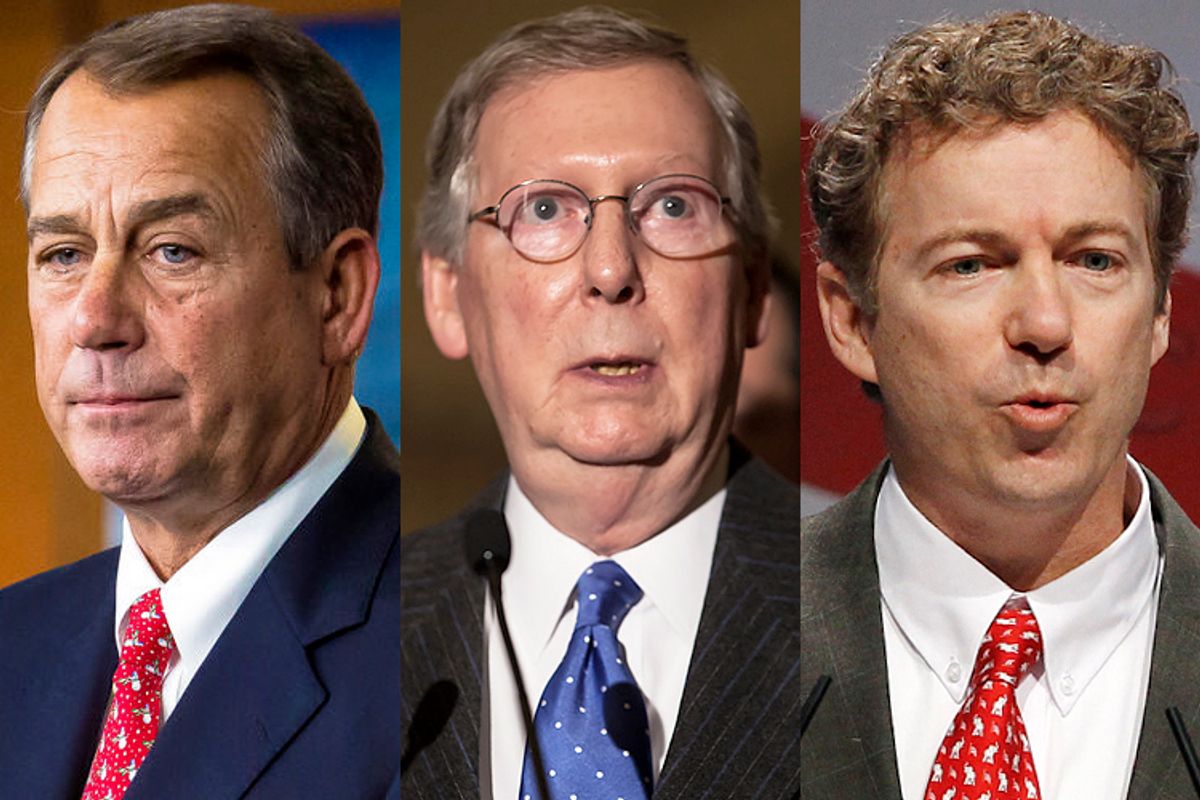The 2012 elections were supposed to create the political space Republicans needed to make their agenda more welcoming to growing Democratic constituencies, but instead it pushed conservatives into a deeper defensive crouch, from which they intimidated GOP leaders into squandering just about every opportunity they've had to broaden the party's appeal.
In some cases, GOP leaders themselves have been reluctant to support the kinds of social and economic policies that might stanch the demographic bleeding that threatens to cost them the White House for another four or eight years.
If you're a regular reader, this is old news. It's been a recurring theme here. The general shape of things in 2013 was that House Speaker John Boehner and the House Republican leadership just ignored legislation they had no interest in passing (the Employment Non-Discrimination Act, for instance), but attempted to legislate when they either sympathized with the cause (immigration reform) or were compelled by deadline to act (the debt limit). In either case, rank and file conservatives threatened full-scale rebellion, which led to a three-week government shutdown and rendered immigration reform comatose.
By the end of the year, Boehner said he'd had enough with the right's reactionary BS, which some people viewed as a harbinger of a long-awaited moderation (I dissented). But then he and other GOP leaders made it clear they aren't terribly excited about extending emergency unemployment benefits. And on Thursday they hinted that they won't be rising to the next occasion either.
A bipartisan group of senior House and Senate lawmakers has introduced legislation that would partially patch the giant hole the Supreme Court blew in the Voting Rights Act last year. And now it's more or less up to Boehner and company to decide whether they support the fix, and, if so, whether they want the right to have veto power over it.
In other words, will the Voting Rights Act fix be like ENDA? Like immigration reform? Or will GOP leadership surprise everyone and adhere to democratic principles, even if it means conservative hard-liners have to grouse among themselves about how poor black people will find it too easy to exercise their franchise.
The early leaks from GOP operatives aren't very promising.
From Roll Call: "The effort does not yet have full buy-in from Republican leadership, said a senior GOP aide."
Leaders are wary of pushback from conservative members and are skeptical that the bill could attract the support of a majority of the Republican Conference. They are also concerned that Democrats would politicize the issue to make gains in the 2014 midterm elections.
Furthermore, Sensenbrenner, a former chairman of the Judiciary Committee and an author of the last extension of the Voting Rights Act in 2006, has occasionally voted against leaders’ priorities, most recently casting a “no” vote on the omnibus appropriations bill. That has damaged his clout with leaders, the aide said.
Part of the objection here is just bizarre. Democrats will politick the issue during the midterms if Republicans kill the VRA patch.
In 2012, the GOP's vote suppression tactics may have backfired by increasing minority voter determination and forcing Democrats to improve their GOTV (Get Out the Vote) operation. Pocket vetoing the VRA patch would invite the same dynamic.
But the full menu of objections suggests that Republicans are considerably more focused on the internal and external political ramifications of fixing the VRA than on the substantive and moral questions the Supreme Court thrust upon them. Not a hopeful sign.
There are one or two countervailing dynamics at work, though.
The bill is designed to attract some non-trivial amount of GOP support, including from Southern Republicans. Rep. Jim Sensenbrenner, R-Wis., who co-authored the bill, told reporters on Thursday that Reps. Trey Gowdy, R-S.C., and Spencer Bachus, R-Ala., have both signed on to the bill, and Sen. Patrick Leahy, D-Vt., expressed unusual confidence that the bill will pass the Senate.
And at the risk of veering into amateur psychology, I'm pretty convinced that some Republican leaders -- particularly Majority Leader Eric Cantor, R-Va. -- sincerely believe it would be wrong to let the Supreme Court's decision be the final word on voting rights in states and districts with histories of minority disenfranchisement.
But with $2 and a bundle of Eric Cantor's best intentions, you can buy a slice of pizza after getting turned away at your polling place in November. And at this point it doesn't look like GOP leaders are interested in putting more than their intentions on the line.

Shares